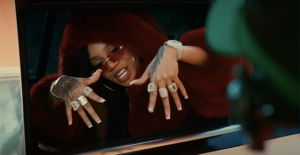
Lil Bibby has a special preference in the women he dates. Bibby shed light on this preference during an interview with Houston Hip Hop Fix.
Bibby wanted to hit up a strip club, but only on one condition. The women have to be bad, light skinned, red bone complexioned and have real hair.
“Who got the baddest,” Bibby asked. “I need light skin, redbone. We don’t need no lace fronts and dark butts. We don’t mess with that.”
“I don’t want no fat hoes,” he added.
“I like a light skin, thick,” he continued. “If she thick, she can have a little stomach but not too much man.”
Lil Bibby’s comments raise a controversial issue in the black community- colorism.
Colorism is a form of prejudice or discrimination in which human beings are treated differently based on a certain skin tone. In the United States’ case, those with lighter skin are treated better.
During slavery, people of African descent were separated based upon their skin tone. Lighter toned enslaved Africans were called “House Niggas” and darker toned enslaved Africans were called “Field Niggas.” Lighter toned Africans were treated better and worked in the houses. Darker toned Africans worked the fields picking cotton.
This preferential treatment has carried over into the present.
Colorism greatly affects those who are represented in media and behind the scenes of Hip Hop. Many lighter toned people of African descent are employed in these positions.
Fya Starta, a popular Chi Town rapper and producer, previously addressed colorism on Twitter.
“Growing up darkskinned they gon try they best to convince u that u ugly n if u yellow u pretty or fine,” he wrote.

Many entertainers have sparked controversy for announcing their preference in women with lighter skins types.
Yung Berg echoed Lil Bibby’s sentiments regarding dark skinned women during an interview with Lip Service Satellite Radio show.
“I’m kinda racist, I don’t like dark butts,” Yung Berg said. “It’s rare that I do dark butts- that’s what I call dark skinned women. I don’t date women dark than me.”
Lil Wayne has long been bashed for his negative views on dark skinned women.
In “Right Above It,” Wayne raps “Beautiful black woman, bet that b***h look better red.”
Lil Wayne even made a guest feature in Eric Benet’s controversial song “Red Bone Girl.”
In “Red Bone Girl,” Wayne raps, “I like them light skin, lighter than a feather.”
Color Lines alleged Benet’s song promoted a “white supremacist beauty standard” with his track.
Benet takes a more poetic approach to describing a love affair he had with a light complexioned woman. Benet begins the song telling the listener he “loves all women.”
“Yes Lord,” he continued. “I love them dark, I love them light. Short, tall, thick, thin and back one more again. But there’s this particular situation I need to tell you about.”
Benet melodically narrates the romantic escapade he enjoyed with the young woman whose “reputation ain’t squeaky and clean,” but still has him captivated with her “devil mind” and “angel face.”
In the song’s hook, Benet sings, “She’s my, redbone girl/ Redbone but she’s my world/ Have you see, my milk chocolate dream/ My redbone girl, redbone girl, yeah/ She’s my, redbone girl,/A bitter sweet, but she’s my world/Coffee cream, thick and lean.”
Benet recently spoke with CBS Local to discuss the criticism his latest effort is generating, according to Color Lines.
“I think it’s its own form of racism, really,” Benet said, according to Color Lines. “A couple years ago I did—I wrote—a song called ‘Chocolate Legs’ about my experience with this—it happened to be a song about a particular experience with a dark skinned lovely young lady.
“And there was no anger,” he continued. “There was no uproar of ‘How dare you!’ You know, so ‘Redbone Girl’ is one song about one experience with a girl who happens to be light complected…there was quite an uproar about that. You can talk about having an experience with a dark-complected person but how dare you talk about having an experience with a light skinned person.”
Lil Wayne would later give dark-skinned women a shout out in the “Dedication 4” outro.
“This is also dedicated to the bad b****es,” Wayne said. “First off, them chocolate women. I know I talk about them yellow b***es all the time. But this is dedicated to them chocolate women. You see I ain’t say b***es or h*es or none of that. And then it’s dedicated to the yellow b***es and the red b****es.”
Famed actor and filmmaker Bill Duke had an idea to spark discussion on colorism.
African-American women, particularly, are affected by notions of westernized beauty and attempt to adopt certain characteristics to mimic the looks of their lighter counterparts.
Duke, along with friend and fellow filmmaker D. Channsin Berry, took on the task of exposing the plight of dark-skinned, African-American women. Shockingly, they learned a woman’s hue has an enormous effect on their self-esteem and feelings of self-worth.
The colorism complex in the black community dates all the way back to slavery.
“Dark Girls” pulls back our country’s curtain to reveal that the deep seated biases and hatreds of racism – within and outside of the Black American culture – remain bitterly entrenched, Duke said, according to official dark girls movie website.
Duke and Berry pose the question on whether “anything has really changed since the days of American slavery when dark-skinned Blacks were made to suffer even greater indignities than their lighter skinned counterparts.”
The documentary takes viewers on a journey through the racial experiences of several dark complexioned women as they tell tales of seclusion and rejection by their own culture and community.
“I can remember being in the bathtub asking my mom to put bleach in the water, so that my skin would be lighter,” said a woman in the documentary.
Another woman in the doc mentioned the commonly heard “pretty for a dark-skinned girl” phrase.
“If we’re all hanging around and a dark-skinned girl walks by ‘Oh, well she’s pretty for a dark skinned girl’ and I’m like ‘what is that supposed to mean?’”
This mental defeatism of one’s own skin color seemingly passes on from generation to generation. One woman in the doc is so ashamed of her skin color that she wishes her children will not come out dark complexioned.
“I think I remember most is saying if I had a little girl I didn’t want her to be dark,” the woman said.
Duke hopes his documentary can end the stigma associated with skin tone and start the healing process the black community has yearned for over 400 years.
“The skin issue is a discussion we all need to have once and for all…so we can eradicate it,” Duke said.
Subscribe to KollegeKidd YouTube Channel by clicking here.
For Updates, Be sure to Follow kollegekidd.com on Twitter @KollegeKidd by clicking here.
You can also stay up-to-date by liking kollegekidd.com FaceBook Page by clicking here





